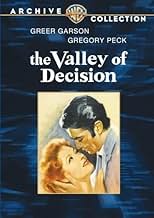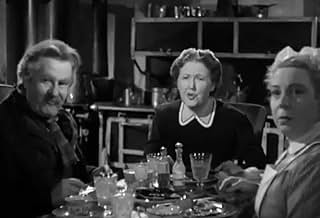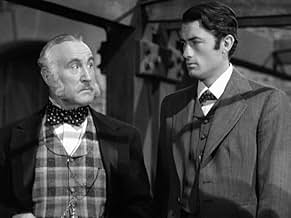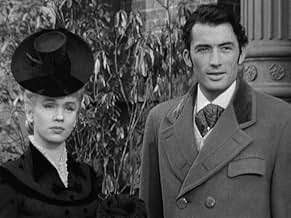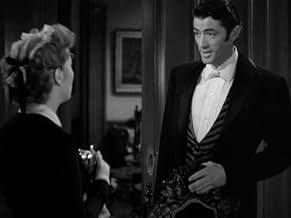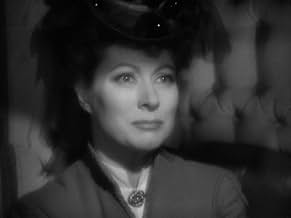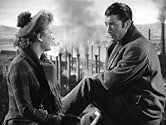IMDb RATING
7.3/10
2.6K
YOUR RATING
An Irish maid falls for the son of her wealthy boss, though their disapproving fathers and a bitter strike at the steel mill complicate matters.An Irish maid falls for the son of her wealthy boss, though their disapproving fathers and a bitter strike at the steel mill complicate matters.An Irish maid falls for the son of her wealthy boss, though their disapproving fathers and a bitter strike at the steel mill complicate matters.
- Director
- Writers
- Stars
- Nominated for 2 Oscars
- 4 wins & 2 nominations total
- Director
- Writers
- All cast & crew
- Production, box office & more at IMDbPro
Featured reviews
When one thinks of Greer Garson, movies like "Mrs. Miniver" or "Pride and Prejudice" come to mind. And when one thinks of Gregory Peck, movies like "To Kill a Mockingbird" or "Gentleman's Agreement" come to mind. However, both of these terrific actors are fantastic in "The Valley of Decision," which I consider to be one of the forgotten classics of the 1940's. It was deservingly nominated for two Academy Awards, including a Best Actress nomination for Greer Garson. I believe she gives one of her most touching, heartfelt performances as Mary Rafferty. This movie is a must-see for all movie fans. I give it an enthusiastic 10 out of 10!
This is a fine historical-era drama, about a Pennsylvania mill-town. In this absorbing drama, which is only one book of a monumental Catholic work by Marcia Davenport, Greer Garson plays a pretty and bright young woman who takes a job in the lavish home of a Pittsburgh steel magnate, played honestly and strongly veteran actor Donald Crisp. Gregory Peck plays one of his sons, the serious one, who is devoted to his father's mill and who works alongside some of the mill workers, including his friend Preston Foster. The father has two other sons--Dan Duryea, who is more desirous of having money rather than of working; and Marshall Thompson, who has turned to alcohol in his unhappiness...There is also a daughter played by the fine actress Marsha Hunt, perhaps one of her best performances. Gladys Cooper plays the matriarch of the family, who befriends Garson, and leaves her her shares in the mill. Garson's father, played with skill by Lionel Barrymore, is an embittered man, who lost the use of his legs in an accident in the mill, and did not want his daughter working for the owners. It is he who begets violence that has tragic consequences. Jessica Tandy plays Peck's wife, a bitter woman; Peck should have married Garsop all along, of course; but the climax of the film is the troubles at the steel mill that are started by the angry workers and the consequences on all concerned of this violent crisis action. There are many finely-developed characters in this long film, but I sense also a fair sense of fatality about the events, intended by the author, against which the attraction of persons, characters and dispositions of Peck and Garson are played, like two rays of sunlight illuminating a dark jungle's zone. Thiis attractive B/W production was directed by Tay Garnett. Marcia Davenport long novel was adapted to the screen by fine scenarist Sonya Levien and John Meehan. The cinematography for the film was the work of Joseph Ruttenberg and Herbert Stothart composed the dramatic score. When I say that the art direction was done by Cedric Gibbons with Paul Groesse, the set decorations by Edwin B. Willis and the costume designs by Irene, I have accounted for the film's very-opulent and vivid production values. In the cast apart from the principals already mentioned, one can see Barbara Everest, Geraldine Wall, Eveline Dockson, John Warburton, Rusell Hicks, Mary Lord, Arthur Shields, young Dean Stockwell, Maru Courier, Lumsden Hare, Connie Golchrist and Anna Q. Nilsson. This is always an attractive and a carefully-considered production, which occasionally seems to me to lack warmth; with a great script, everyone concerned could perhaps have produced a masterpiece. With the one they had, the talents involved produced a memorable adventure that rises on occasion to first-rate dramatic heights. Not to be missed, perhaps. I would love to see it redone, with another fine cast; more than melodrama, it has I believe as a writer, an important dramatic potential.
I sat in awe of this film one chilly October evening in 2001 and I remember the thought going through my mind, "how is it that I've never seen this before?" I adore Greer Garson and her performance as Mary Raffery took my breath away and Gregory Peck has always been at the top of my list of talented and handsome actors. This movie is full of anxiety ridden romance and dramatic acting at its best. With a superb cast and a wonderful story line, I'd recommend this movie to anyone that feels they're able to truly recognize greatness.
Greer Garson, with a terrific Irish brogue, earned still another Oscar nomination. With the exception of 1940, Miss Garson was nominated for best actress from 1939-1945, a Hollywood record.
The film depicts the old problem of wealth vs. poverty. A pretty and pert Greer goes to work for the family of Gregory Peck. They are lovely, unpretentious people. Her dad, played by the irascible Lionel Barrymore, is a hot head if ever there were. His hot-headedness will ultimately lead to his downfall as the film goes on.
We see wealth and snobbery associated with it, especially by Peck's wife, brilliantly played by a young Jessica Tandy. In a change of pace, veteran movie mother, Gladys Cooper, comes off as a wonderfully, kind sort of matriarch married to the indomitable Donald Crisp.
The ending is great. All I can say is that fairness triumphs over snobbery. Class distinctions just seem to go away.
The film depicts the old problem of wealth vs. poverty. A pretty and pert Greer goes to work for the family of Gregory Peck. They are lovely, unpretentious people. Her dad, played by the irascible Lionel Barrymore, is a hot head if ever there were. His hot-headedness will ultimately lead to his downfall as the film goes on.
We see wealth and snobbery associated with it, especially by Peck's wife, brilliantly played by a young Jessica Tandy. In a change of pace, veteran movie mother, Gladys Cooper, comes off as a wonderfully, kind sort of matriarch married to the indomitable Donald Crisp.
The ending is great. All I can say is that fairness triumphs over snobbery. Class distinctions just seem to go away.
In Pittsburgh in 1873, plucky Irish immigrant Greer Garson accepts a position as a servant in the mansion of steel magnate Donald Crisp, though her father was crippled in his mill. Inevitably, Greer and Gregory Peck (as the principled second son of the family) find themselves drawn to each other despite class differences, and surprisingly, his parents spprove. But a series of dramatic events -- a steelworkers' strike, three violent killings, a spite marriage, a natural death and a surprising bequest -- all conspire to keep Greer and Greg apart while the audience is left to wonder when and how they can get together.
In a way we don't care since these mismatched stars have no chemistry together. In only his third screen role, Gregory Peck is always competent and is sometimes better than that, but his cool, placid demeanor works against this tale of romance thwarted for over a decade. For her part, Greer Garson was never one to suggest sexual attraction or romantic passion, and she has the further handicap of looking much older than Peck and seeming too old to play her character in the early parts of the film. But by the end, when her character's age has caught up to her, Garson's usual poise and authority seem just right.
If the lack of fireworks between the stars seems like a drawback, it somehow isn't because the narrative is really about the love affair an unhappy woman has with a warm, charismatic family. And here, the producer and the director Tay Garnett make sure the film is enlivened with a talented and varied supporting cast including Donald Crisp, Gladys Cooper, Lionel Barrymore (a hambone as usual), Dan Duryea, Preston Foster, Reginald Owen, Marshall Thompson and young Dean Stockwell.
Of particular interest are two excellent supporting performances. MGM stalwart Marsha Hunt brings some bite and complexity to the role of Peck's sister, a selfish, superficial woman who is nevertheless decent and loving. And though Jessica Tandy spends most of the film in a thankless role as a brittle society girl hoping to snag Peck, by the end of the film she is allowed to give a vivid performance of bravura shrewishness, the kind of thing Agnes Moorehead usually did so well.
In a way we don't care since these mismatched stars have no chemistry together. In only his third screen role, Gregory Peck is always competent and is sometimes better than that, but his cool, placid demeanor works against this tale of romance thwarted for over a decade. For her part, Greer Garson was never one to suggest sexual attraction or romantic passion, and she has the further handicap of looking much older than Peck and seeming too old to play her character in the early parts of the film. But by the end, when her character's age has caught up to her, Garson's usual poise and authority seem just right.
If the lack of fireworks between the stars seems like a drawback, it somehow isn't because the narrative is really about the love affair an unhappy woman has with a warm, charismatic family. And here, the producer and the director Tay Garnett make sure the film is enlivened with a talented and varied supporting cast including Donald Crisp, Gladys Cooper, Lionel Barrymore (a hambone as usual), Dan Duryea, Preston Foster, Reginald Owen, Marshall Thompson and young Dean Stockwell.
Of particular interest are two excellent supporting performances. MGM stalwart Marsha Hunt brings some bite and complexity to the role of Peck's sister, a selfish, superficial woman who is nevertheless decent and loving. And though Jessica Tandy spends most of the film in a thankless role as a brittle society girl hoping to snag Peck, by the end of the film she is allowed to give a vivid performance of bravura shrewishness, the kind of thing Agnes Moorehead usually did so well.
Did you know
- TriviaFeature film debut of Dean Stockwell.
- GoofsWhen Mary is leaving for Europe after stopping at her father's house, she rushes away without her satchel containing all her belongings. She boards the carriage without it, and Jim, who accompanies her outside, is not carrying it either.
People sometimes do forget to take their bags when leaving for a trip. Also, as Constance wanted Mary to come with her, and she and her husband are quite wealthy, they would simply buy Mary a contemporary continental wardrobe.
- Quotes
Paul Scott: [Mary is upset over her father's stubbornness and begins crying. Paul leads her to a bluff overlooking Pittsburgh's steel mills] You can see all of Pittsburgh from here, but Pittsburgh can't see you. Why don't you sit down and cry it out?
- ConnectionsReferenced in Romance sans lendemain (1954)
- SoundtracksMolly Baun
(uncredited)
Traditional Irish Ballad
Sung a cappella by Greer Garson
Also played a bit in the score
- How long is The Valley of Decision?Powered by Alexa
Details
- Release date
- Country of origin
- Language
- Also known as
- El valle de la abnegación
- Filming locations
- Production company
- See more company credits at IMDbPro
Box office
- Budget
- $2,160,000 (estimated)
- Runtime
- 1h 59m(119 min)
- Color
- Aspect ratio
- 1.33 : 1
Contribute to this page
Suggest an edit or add missing content


